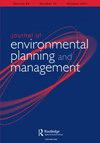Indigenous knowledge indicators employed by farmers for adaptation to climate change in rural South Africa
IF 3.6
4区 经济学
Q1 DEVELOPMENT STUDIES
Journal of Environmental Planning and Management
Pub Date : 2023-11-10
DOI:10.1080/09640568.2022.2086854
引用次数: 6
Abstract
The majority of indigenous farmers in South Africa depend on rain-fed agricultural production for their livelihoods. Reliable indigenous weather forecasts are, therefore, required to guide rural farmers’ decisions in regard to climate change. Much of the literature has shown that western scientific knowledge has failed at rural level. Indigenous knowledge has, for the past century assisted rural farmers’ households in tackling the challenges of climate stressors and enhanced decision-making for adaptation. There is, therefore, much room for advancement in assessment processes to ensure adequate credit for indigenous knowledge systems. This study aimed to address two major knowledge gaps (i) to assess the relevance of indigenous knowledge in weather forecasts used by local farmers for climate adaptation, and (ii) examine farmers’ perceptions in regard to climate change in Levubu and Nwanedi sites. Indigenous knowledge indicators used by farmers for weather forecasting, within their communities, were collected through questionnaires, interviews and focus group discussions. The results revealed various forms of indigenous indicators used by local farmers for weather forecasting, such as, star and moon movement, appearance of red and black ants and mist-cover on mountains. A better knowledge of indigenous knowledge systems should play an important role in determining suitable adaptation strategies toward climate change. It is recommended, hence, that policy makers should enhance indigenous knowledge among local communities regarding the implications of climatic stressors to increase crop production.南非农村农民用于适应气候变化的土著知识指标
南非的大多数土著农民依靠雨水灌溉的农业生产维持生计。因此,需要可靠的当地天气预报来指导农村农民在气候变化方面的决策。许多文献表明,西方科学知识在农村层面已经失败。在过去的一个世纪里,土著知识帮助农村农民家庭应对气候压力的挑战,并加强了适应决策。因此,在评估过程中有很大的进步空间,以确保对土著知识系统的充分信任。这项研究旨在解决两个主要的知识差距:(i)评估当地农民在天气预报中使用的本土知识对气候适应的相关性,以及(ii)研究农民对Levubu和Nwanedi地区气候变化的看法。农民在其社区内用于天气预报的土著知识指标是通过问卷调查、访谈和焦点小组讨论收集的。研究结果揭示了当地农民用于天气预报的各种形式的本土指标,如星星和月亮的移动、红蚂蚁和黑蚂蚁的出现以及山上的薄雾。更好地了解土著知识系统应在确定应对气候变化的适当适应战略方面发挥重要作用。因此,建议决策者加强当地社区对气候压力因素对增加作物产量的影响的本土知识。
本文章由计算机程序翻译,如有差异,请以英文原文为准。
求助全文
约1分钟内获得全文
求助全文
来源期刊
CiteScore
9.10
自引率
5.10%
发文量
155
期刊介绍:
Journal of Environmental Planning and Management has already established itself as a leading forum for up-to-date scholarly but accessible papers on all aspects of environmental planning and management. With contributions from leading international authors, the Journal publishes influential, high quality papers -an essential feature whether you are a subscriber, reader, contributor or all three. The Editors and International Editorial Advisory Board are drawn from around the world and are committed to encouraging researchers and practitioners to contribute to multidisciplinary and international debate in the field. The central aim is to focus on the integrated planning and management of the environment.

 求助内容:
求助内容: 应助结果提醒方式:
应助结果提醒方式:


